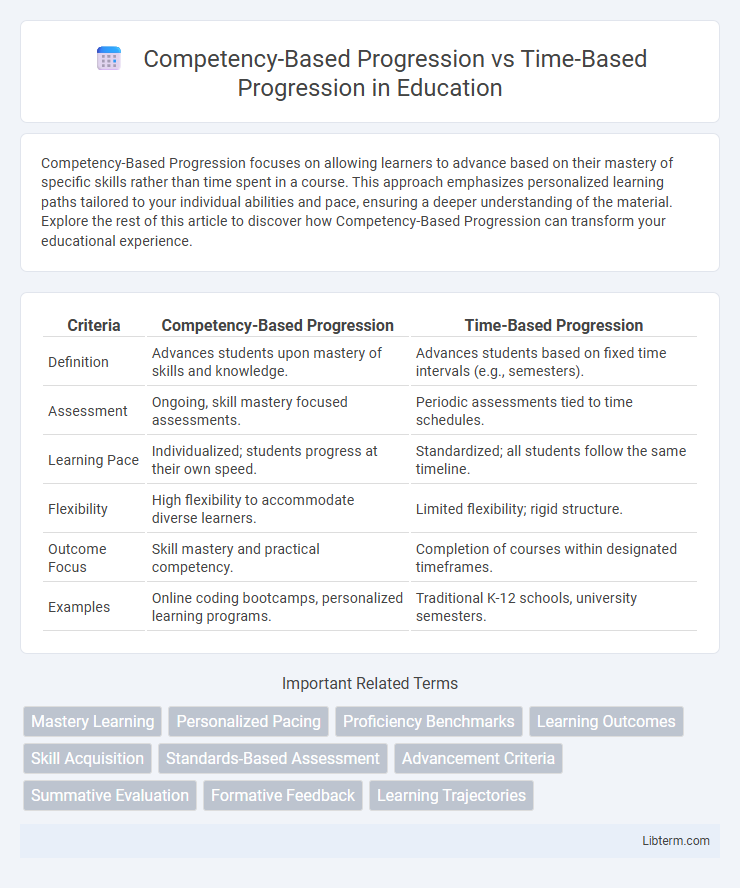Competency-Based Progression focuses on allowing learners to advance based on their mastery of specific skills rather than time spent in a course. This approach emphasizes personalized learning paths tailored to your individual abilities and pace, ensuring a deeper understanding of the material. Explore the rest of this article to discover how Competency-Based Progression can transform your educational experience.
Table of Comparison
| Criteria | Competency-Based Progression | Time-Based Progression |
|---|---|---|
| Definition | Advances students upon mastery of skills and knowledge. | Advances students based on fixed time intervals (e.g., semesters). |
| Assessment | Ongoing, skill mastery focused assessments. | Periodic assessments tied to time schedules. |
| Learning Pace | Individualized; students progress at their own speed. | Standardized; all students follow the same timeline. |
| Flexibility | High flexibility to accommodate diverse learners. | Limited flexibility; rigid structure. |
| Outcome Focus | Skill mastery and practical competency. | Completion of courses within designated timeframes. |
| Examples | Online coding bootcamps, personalized learning programs. | Traditional K-12 schools, university semesters. |
Understanding Competency-Based Progression
Competency-based progression prioritizes mastery of specific skills and knowledge over the duration spent in a learning environment, allowing learners to advance upon demonstrating proficiency. This approach fosters personalized learning paths, ensuring students acquire essential competencies before moving forward. Data shows competency-based models can improve retention and skill application compared to traditional time-based systems.
Defining Time-Based Progression
Time-based progression refers to an education system where students advance through curriculum based on fixed time intervals, such as semesters or academic years, regardless of their mastery of the material. This model emphasizes seat time and age cohorts rather than individual learning pace or demonstrated competencies. It often results in standardized timelines for completion rather than personalized achievement benchmarks.
Key Differences Between Competency and Time-Based Models
Competency-Based Progression emphasizes mastery of specific skills and knowledge before advancing, while Time-Based Progression moves learners forward after completing a fixed duration regardless of proficiency. Competency models prioritize individualized learning paces, ensuring outcomes meet predefined standards, whereas time-based models prioritize uniform schedules and seat time over demonstrated ability. This fundamental difference impacts assessment strategies, learner motivation, and educational flexibility.
Advantages of Competency-Based Progression
Competency-Based Progression allows learners to advance upon mastery of specific skills, leading to personalized learning speeds and improved knowledge retention. This approach enhances motivation by providing clear, measurable goals and timely feedback, fostering deeper engagement. Educational institutions benefit from better alignment with workforce requirements, as students acquire relevant competencies that meet industry standards.
Benefits and Challenges of Time-Based Approaches
Time-based progression offers a consistent and easily understandable framework for learners by allocating fixed time periods for course completion and skill acquisition, promoting structured pacing and predictable scheduling. However, this approach may limit personalized learning opportunities and fail to accommodate individual learner differences, potentially resulting in varied levels of mastery upon advancement. Challenges include the risk of stagnation for faster learners and insufficient practice for those needing more time, which can impact overall educational effectiveness and learner motivation.
Impact on Student Engagement and Motivation
Competency-Based Progression enhances student engagement and motivation by allowing learners to advance upon mastering specific skills, fostering a personalized and self-paced educational experience that aligns with individual abilities. In contrast, Time-Based Progression often leads to disengagement as students must progress within fixed time frames regardless of their understanding, which can cause frustration or boredom. Research shows students in competency-based models demonstrate higher motivation levels due to clear goal-setting, immediate feedback, and ownership of their learning journey.
Measuring Success in Both Progression Models
Measuring success in competency-based progression relies on clearly defined mastery of skills and knowledge, assessed through performance tasks and real-world applications, ensuring learners advance only upon demonstrating proficiency. In contrast, time-based progression measures success by the completion of predetermined time frames or credit hours, often emphasizing seat time over actual understanding. Both models require robust assessment systems, but competency-based approaches prioritize personalized learning outcomes while time-based models focus on standardized pacing and curriculum coverage.
Flexibility and Personalization in Learning
Competency-based progression allows learners to advance upon mastering specific skills, offering greater flexibility and personalization compared to traditional time-based progression models, which require fixed timeframes regardless of individual readiness. This approach supports tailored learning paths that adapt to each student's pace, promoting deeper understanding and mastery. Personalized feedback and self-paced assessments further enhance learners' engagement and success by aligning education with their unique needs.
Implementation Challenges and Solutions
Competency-Based Progression (CBP) faces implementation challenges such as accurately assessing skills, aligning curricula with industry standards, and ensuring faculty are trained in new evaluation methods. Solutions include adopting robust assessment technologies, collaborating with industry experts to define competencies, and providing continuous professional development for educators. In contrast, Time-Based Progression relies on fixed schedules, which simplify administration but may hinder personalized learning and mastery, necessitating flexible scheduling and adaptive support systems to enhance effectiveness.
Future Trends in Educational Progression Models
Competency-Based Progression models emphasize mastery of skills over fixed timeframes, enabling personalized learning paths that adapt to individual student needs. Future trends in educational progression are shifting towards integrating digital assessment tools and real-time data analytics to track competencies more accurately and support continuous improvement. This evolution promises increased flexibility, equity, and efficiency in education by prioritizing demonstrated abilities rather than seat time.
Competency-Based Progression Infographic

 libterm.com
libterm.com